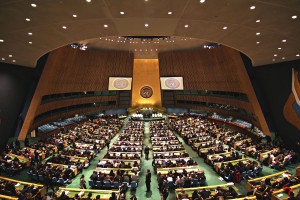UNITED NATIONS — Presidents, prime ministers, kings and potentates are gathering in New York for the 69th General Assembly of the UN.
But as diplomats come together for the annual general debate which begins on Sept. 24, there’s a cloud of political and social unease greeting delegations from the 193 member states in the form of issues ranging from regional wars, to humanitarian crises, nuclear proliferation, the spread of infections disease, and the scimitar of ISIL terrorism.
Secretary General Ban Ki-moon concedes stoically that, “We are living in an era of an unprecedented level of crisis and troubles.”
 Indeed the violence levels and threats are daunting even according to seasoned diplomats. For the 140 chiefs of state and government who plan to attend the session, including President Barack Obama, Francois Hollande of France, Park Geun-Hye of South Korea, and King Abdullah of Jordan, the challenges will be glaring.
Indeed the violence levels and threats are daunting even according to seasoned diplomats. For the 140 chiefs of state and government who plan to attend the session, including President Barack Obama, Francois Hollande of France, Park Geun-Hye of South Korea, and King Abdullah of Jordan, the challenges will be glaring.
In comments to the press, Secretary General Ban overviewed some of the issues: “We will address the horrendous violence in Syria and Iraq.” Ban praised the “growing international consensus to act against this serious threat to global peace and security.”
Significantly, the Secretary General welcomes, “the decisive and firm commitment of the U.S. to fight against terrorism which is a common enemy for humanity.”
He added however that beyond the Middle East that violence continues in Mali, South Sudan and Central African Republic and that “we will not let these crises be forgotten.”
Ban conceded, “the situation in and around Ukraine remains volatile. And in Libya, order is breaking down. “He added, “The world is facing multiple crises, each has its own dynamics, and requires its own approach.” He added, “All have dangerous sectarian, ethnic or tribal dimensions.”
But beyond the mix of toxic armed conflicts, the UN is confronted with growing refugee numbers, rebuilding after natural disasters, and West Africa’s horrible humanitarian health emergency resulting from the spreading Ebola epidemic.
Naturally, each annual Assembly session is remembered for its controversial speakers as much as for its achievements.
In recent years, Libya’s radical Col. Gadhafi, Islamic Iran’s president Mahmoud Ahmadinjad, and Venezuela’s Hugo Chavez were among them. This year Iran’s new less openly controversial leader Hassan Rouhani will lead the delegation, Zimbabwe’s perennial dictator Robert Mugabe will return too. Russia’s President Vladimir Putin will skip the session as will the Mainland Chinese leader Xi Jinping.
On a lighter note, the massive renovations at the UN complex are nearly complete.
The elegant and iconic domed General Assembly hall has been modernized, reopened and looks splendid. Indeed, most of the 17-acre complex on New York’s East River has less of the look and bustle of a perpetual “work site” than a setting for global diplomacy and humanitarian coordination. Long overdue indeed.
Kahamba Kutesa of Uganda, has been chosen as President of the 69th Assembly.
The annual Assembly has its own long list of agenda items ranging from the Middle East, to nuclear non-proliferation, poverty and the myriad of UN peacekeeping operations. Most of the real work is done on the sidelines of the speeches where delegations often prefer quiet and discreet contacts out of the limelight.
But it’s precisely the deterioration of specific crisis which merits not only attention but wider concern.
Take the north African country of Libya. Three years ago, Libya was set to be a poster child for multinational cooperation; the UN Security Council allowed intervention under the responsibility to protect, instead turned to permit the toppling of a ruthless tyrant. Yes, but then what? Into the power vacuum came militias, Islamic fundamentalists, and UN officials warn the country is “closer to the brink of protracted conflict and civil strife.”
For Americans, the Libyan saga leaves a particularly bitter legacy. The U.S. Consulate in Benghazi, totally under-protected given the impending threat, was systematically attacked on Sept. 11, 2012, by Al Qaida-linked militants. Amb. Chris Stevens and three security personnel were killed and the American diplomatic complex was trashed by the mob. Washington was unprepared.
There are other looming challenges. Ebola is spreading throughout West Africa. As Secretary General Ban warned, “This has gone beyond health issues. It has gone to the areas of affecting social and economic situations.” He added it may “affect the political stability if not properly contained and properly treated.” A World Bank survey reported separately that the affected countries could experience a “potentially catastrophic blow” to their economies.
The Assembly meets in a pivotal historic period in which world leaders must confront the swath of crises or reap the bitter whirlwind of inaction.
John J. Metzler is a U.N. correspondent covering diplomatic and defense issues. He writes weekly for WorldTribune.com. He is the author of Transatlantic Divide ; USA/Euroland Rift (University Press, 2010)


You must be logged in to post a comment Login